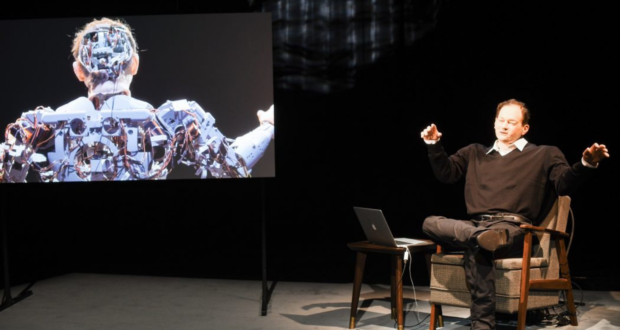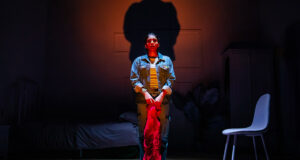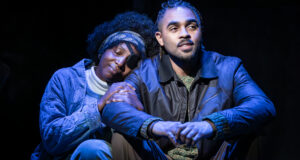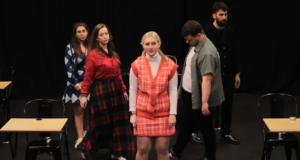An extraordinary, cerebral production that explores the uneasy space between the living human and the artificial. Uncanny Valley raises unsettling questions that will have your brain ticking!Summary
Rating
Excellent
‘Uncanny valley’ is a term used to describe that uneasy feeling when you recognise a humanoid is lifelike, but you are emotionally unsettled by a sense of artificiality in its portrayal of humanity. What is it that is absent? In this extraordinary performance from Rimini Protokoll Company, our host is an animatronic version of German author Thomas Melle. It looks a lot like him, but it is clearly an imitation.
The real Melle is not physically present at all, but his voice speaks through the robot, and he/it gives a presentation on ideas concerning human relationships with Artificial Intelligence (AI) and technology. There is very little action in the performance, as the robot never leaves the chair. He moves awkwardly and supplements his speech only with images on a screen, but he is still hugely compelling as he attempts to emulate human qualities, whilst telling a very human story. It’s a really peculiar experience for the spectator; definitely disquieting, but intellectually highly stimulating and thought-provoking. The audience can’t watch passively, but is put in an unsettled state where they’re made to consciously consider how we interact and respond to each other: what pre-programmed repetitive human signals we look for to identify authenticity in AI; how we come to ‘believe’ and how we use empathy. We are even interrogated as to our motives in being at this stage event where the actor is not present – or is he? The whole thing raises many questions about power play and social behaviours, and really deserves a PhD paper rather than just a theatre review!
Melle scrutinises features of his bipolar disorder and his creative work. He describes how he is better able to function when invisible behind the humanoid, shielding his vulnerable self from society. He queries what one might learn by studying a copy of oneself, but also what happens when the copy takes over? It’s all fascinating, and at times quite humorous, as we flip between both sides of the looking glass.
We are shown how programming technology can help and hinder the individual. In the presentation, one man is able to hear again through an aural prosthesis. But we also learn the tragic story of the social reprogramming of scientist Alan Turing, who invented the first digital computer. Although he was a hero and contributed significantly to ending WWII, as a homosexual he was himself ‘reprogrammed’ by enforced chemical castration, leaving him unable to recognise himself; thus in a form of uncanny valley. Turing ended his own life, unable to cope.
The subtle lighting in the show is discreetly effective. At times it alters the look of the robot, making it more or less artificial, which unsettles us further. It throws vast shadows across the wall, which could be of a human or not, adding to the sense of enigma. Reinforcing ideas of autonomous AI, a robotic lighting machine whirls round at the command of Melle’s voice, but later continues to move without any obvious human intervention, and not commented on.
Director Stefan Kaegi has created a truly remarkable piece of work: a vortex of thoughts on human power and instability; on objects as means of understanding our world; of the reality of what we perceive and also of the artifice of the theatre. He constructs a new space from which to look differently at ourselves and our society. By the end of the show our relationship with that piece of silicone and metal has changed utterly. We better understand the strengths and fragility of its construction, of its rigid programming, but also question those of our own human randomness.
Devised by Rimini Protokoll (Stefan Kaegi) and Thomas Melle
Produced by Münchner Kammerspiele
Concept, Text & Direction: Stefan Kaegi
Text / Body / Voice: Thomas Melle
Video Design: Mikko Gaestel
Music: Nicolas Neecke
Light Design: Rimini Protokoll
Sound and Videodesign: Rimini Protokoll
Uncanny Valley plays at Battersea Arts Centre until 26 February. All shows are sold out, but returns may be available at the time. Further information via the below link.
 Everything Theatre Reviews, interviews and news for theatre lovers, London and beyond
Everything Theatre Reviews, interviews and news for theatre lovers, London and beyond



